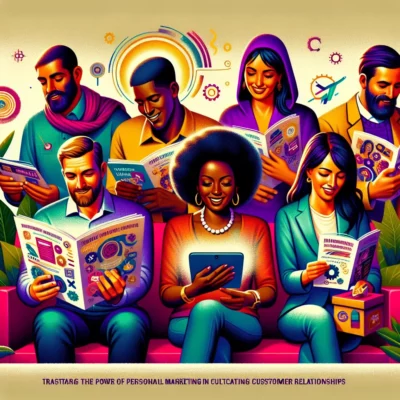In a world where consumers are bombarded with countless marketing messages daily, standing out requires more than just eye-catching visuals or catchy slogans. Enter tailored marketing: a strategy that not only grabs attention but also fosters a deeper connection with customers. This approach is all about creating personalized experiences that resonate with individuals on a personal level, ultimately building loyalty and driving long-term engagement.
Understanding Tailored Marketing
Tailored marketing, often synonymous with personalized marketing, is the practice of customizing marketing messages and campaigns to fit the unique preferences, behaviors, and needs of individual customers. Unlike generic marketing, which targets a broad audience with a one-size-fits-all message, tailored marketing focuses on delivering content that feels personal and relevant.
Key Differences:
- Generic Marketing: Broad, one-size-fits-all approach, less personal.
- Tailored Marketing: Customized, data-driven, highly relevant.
The importance of tailored marketing in today’s market cannot be overstated. With consumers expecting brands to understand and anticipate their needs, personalization has become a key differentiator. Personalized marketing enhances customer engagement by making interactions feel more meaningful and relevant, thus increasing the likelihood of conversion and loyalty.
The Psychology Behind Personalization
The effectiveness of tailored marketing is rooted in psychological principles. Personalization taps into the human desire for recognition and understanding. When customers feel that a brand truly understands them, they are more likely to develop trust and a sense of loyalty.
Psychological Principles:
- Recognition: People appreciate being acknowledged as individuals.
- Relevance: Personalized messages resonate more deeply, making them more memorable.
- Emotional Connection: Tailored marketing often evokes emotions, strengthening customer relationships.
Studies have shown that personalized marketing strategies can significantly increase customer engagement. For example, a study by Accenture found that 91% of consumers are more likely to shop with brands that provide relevant offers and recommendations.
Crafting Tailored Marketing Materials
Creating effective tailored marketing materials requires a strategic approach to data collection and utilization. It’s crucial to gather customer data ethically and transparently, ensuring that privacy concerns are addressed.
Strategies for Data Collection:
- Surveys and Feedback: Direct input from customers about their preferences.
- Purchase History Analysis: Insights into buying patterns and preferences.
- Behavioral Tracking: Understanding how customers interact with your brand online.
Several tools and technologies facilitate the creation of personalized content. Customer Relationship Management (CRM) systems, data analytics platforms, and AI-driven personalization tools are invaluable in crafting messages that resonate with individual customers.
Successful Campaigns:
- Spotify’s “Wrapped”: Personalized year-in-review playlists that engage users by reflecting their unique music tastes.
- Amazon’s Recommendations: Tailored product suggestions based on browsing and purchase history.
Building Deeper Customer Connections
Personalized marketing materials do more than just sell products; they create a sense of belonging and understanding. When customers feel that a brand aligns with their values and lifestyle, they are more likely to form a lasting connection.
Role of Storytelling:
- Storytelling in marketing makes messages more relatable and memorable.
- Personal stories and testimonials can enhance the emotional appeal of marketing materials.
Aligning marketing messages with customer values is crucial. Brands that successfully communicate shared values and beliefs are more likely to foster loyalty and advocacy among their customer base.
Driving Brand Loyalty Through Personalization
Tailored marketing is a powerful tool for fostering long-term customer relationships. By consistently delivering personalized experiences, brands can enhance customer retention and encourage brand advocacy.
Impact on Customer Retention:
- Personalized experiences make customers feel valued, increasing their likelihood of returning.
- Tailored marketing can turn satisfied customers into brand advocates, who promote the brand to others.
Maintaining personalization efforts as customer preferences evolve is essential. Regularly updating customer profiles and preferences ensures that marketing messages remain relevant and effective.
Future of Tailored Marketing
As technology continues to advance, so too will the capabilities of tailored marketing. Trends such as hyper-personalization, where marketing is customized to an even greater degree, are on the horizon. However, with these advancements come challenges, such as ensuring data privacy and managing the complexity of highly personalized campaigns.
Role of AI and Machine Learning:
- AI can analyze vast amounts of data to uncover insights and automate personalization efforts.
- Machine learning algorithms can predict customer preferences and optimize marketing strategies in real-time.
Brands must stay adaptive and innovative in their personalization efforts to remain competitive. By embracing new technologies and continuously refining their strategies, businesses can ensure that they are meeting the evolving needs of their customers and maintaining strong, loyal relationships.
In the ever-evolving landscape of digital marketing, crafting connections through tailored marketing is not just a strategy—it’s a necessity. By understanding and implementing personalized marketing techniques, brands can foster deeper connections, drive loyalty, and ultimately, thrive in a competitive market.
